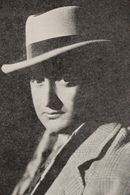American director Al Santell, formerly billed as 'Al' Santell, embarked on a remarkable career in the film industry, marked by a series of significant milestones. With a background in architecture, having graduated from Los Angeles University, Santell began his journey in 1914 as a general factotum at the Lubinville Studio in Philadelphia.
Over time, he worked his way up the ladder, eventually becoming a director and scenarist, handling one- and two-reel short comedy subjects for prominent studios such as Mack Sennett, Hal Roach, and Kalem. His talent and dedication earned him a brief stint in the army from 1918 to 1919, after which he advanced to supervising manager at Universal.
Santell's subsequent rise to prominence led to him being given his own comedy series, the "Alfred Santell Comedies," which starred a trained chimpanzee named Joe Martin. By 1923, he had transitioned to feature film direction and signed a lengthy contract with First National.
As a renowned light comedy specialist, Santell successfully adapted to the advent of sound in the film industry. Over the next 15 years, he directed a string of solid second features and occasional "A"-grade releases for major studios such as 20th Century-Fox, RKO, Paramount, and United Artists.
One of his most notable talkies was Internes Can't Take Money (1937),an early entry in the "Dr. Kildare" cycle, starring Joel McCrea and Barbara Stanwyck. The New York Times critic praised Santell's direction, describing it as a "blend of [Alfred Hitchcock] suspense and American verve."
Other notable highlights in Santell's career include his work on early versions of The Sea Wolf (1930),starring Jane Keithley, who later became his wife, as well as Rebecca of Sunnybrook Farm (1932),Winterset (1936),Aloma of the South Seas (1941),and the biopic Jack London (1943).
Santell retired from directing in 1946, following the completion of a few B-movies for Republic.































